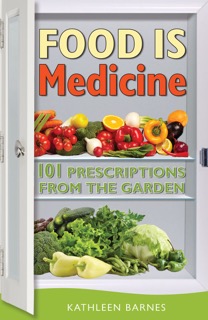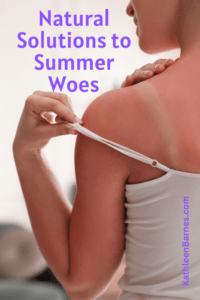 Have you planted your garden yet? It’s the perfect time. Even if you only have a potted tomato on your urban balcony or a couple of herbs on your kitchen window sill, gardening is :
Have you planted your garden yet? It’s the perfect time. Even if you only have a potted tomato on your urban balcony or a couple of herbs on your kitchen window sill, gardening is :
- personally rewarding
- offers you the freshest foods possible
- healthy, and
- great exercise
I fully admit my addiction to gardening!
Since summer has now truly arrived, I thought I’d share with you a couple of pertinent entries for this time of year from my latest book, Food Is Medicine: 101 Prescriptions from the Garden:
SUNBURN
Note: We all need sun. It is the best way to manufacture the vitamin D that is so crucial to so many body processes. However, enough is enough. Moist people need about 15 minutes of direct sunlight a day or exposed arms and legs. More can cause a burn. Sunburn is skin damaging, so don’t do it, if you can possible help it! But if you did overindulge, here’s how to handle it:
Your Garden RX: cucumbers, eggplant, potato, tomato, chamomile
We’ve all been there, intentionally or not: We’ve been too long in the sun and find ourselves with a painful burn. When it happens only occasionally, it’s a minor inconvenience. The sunburn will usually fade within days (and you most likely won’t be tan underneath). You may need to avoid the friends who invariably want to slap you on the back during this time, and the outer layer of skin may peel, but in the short term, sunburn is no big deal.
In the long term, however, repeated sunburns can be a very big deal, significantly increasing your risk of skin cancers, including potentially deadly melanoma.
When you’re out in the sun, wear a hat. Better yet, if you’re out for more than a few minutes, put on a zinc oxide–based sunscreen, the safest kind around.
Your Garden to the Rescue
A cool cucumber paste will ease the pain quickly, as will pulverized eggplant.
Rubbing a cut potato on the burned area will ease the pain, as will a cool chamomile tea wash.
If you’re looking for a natural sunscreen, add tomatoes to your diet on a regular basis. The lycopene in tomatoes gives you natural sun protection from within, but don’t count on that for complete sun protection. You’ll still need sunscreen (a natural one!) hat and protective clothing.
INSECT BITES
Your Garden Rx: comfrey, plantain, pennyroyal
Insect bites have plagued humans and their four-legged friends since the beginning of time. Mosquito and gnat bites are generally annoying, but for the most part, they are not particularly dangerous. Some insect bites, however, can be dangerous, like those of ticks, bees, wasps, fire ants and certain kinds of spiders.
Your Garden to the Rescue
Prevention is the best remedy, but avoid toxic commercial bug sprays that contain DEET, which can cause neurological problems and even cardiac arrest.
You can also crush some pennyroyal and roll it up in a bandanna to wear around your neck or to tie onto your dog for effective insect repellent.
If you have been bitten, one of the quickest and most effective remedies is to crush or better yet, chew a few plantain leaves (the ones that grow everywhere, including in the driveway!) and rub them on the site.
Comfrey is extremely helpful for more serious reactions. I dip a comfrey leaf briefly in boiling water and wrap it around the site, securing it with an old plastic bag or a piece of plastic wrap. The effects of all but the most serious bites will be gone in a few hours. I also make a salve of comfrey and eucalyptus to keep gnats and flies away and heal minor skin problems.
RX from Outside Your Garden
To make a great natural insect repellant, mix five drops of each of the following essential oils in a three-ounce spray bottle of water:
- Eucalyptus
- Pennyroyal
- Citronella
- Lemongrass
- Cedarwood
Apply liberally to yourself and your clothing. It’s so effective, I use it on my horses and dogs as well.







